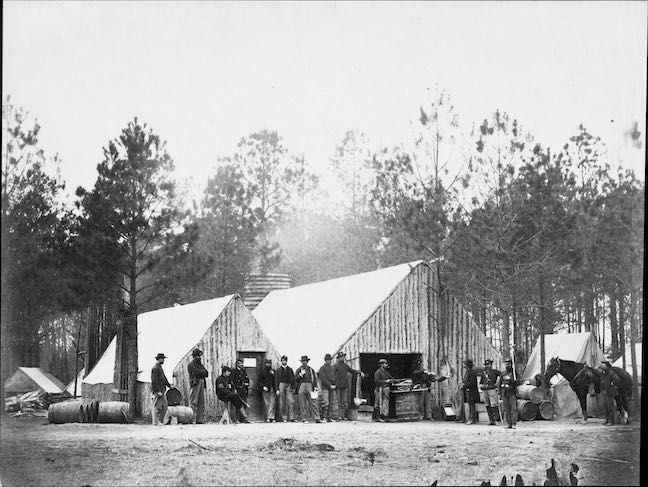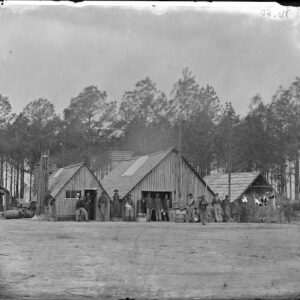| Credit: | by OSullivan (Timothy H.) |
|---|---|
| Date: | 1864.04 |
| Negative Size: | 8 in. x 10 in. |
| Equipment: | barrel; barrel tap; bayonet; crate; horse; long gun; pipe; pitcher; saddle; saw; scale; scoop; stool; sword |
| Locations & Lines: | Brandy Station VA; Virginia |
| Military Units: | Army of the Potomac; US Army |
| Structures & Establishments: | Army of the Potomac Commissary Department (Brandy Station VA) |
| Sources: | Library of Congress; National Archives |
$6.99
File Details: AILPm, 800 DPI, TIFF, Original Photograph, 40.1 Mb
Image ID: AILP
Gardners Photographic Sketch Book Of The War. Vol. 2, No. 61. Commissary Department, Head-Quarters Army of the Potomac. February, 1864. The Commissary at General Headquarters of the Army of the Potomac was nothing less than an immense grocery establishment. Coffee, tea, sugar, molasses, bacon, salt pork, fresh beef, potatoes, rice, flour, &c., were always kept on hand in large quantities, and of the best quality. This institution was under the charge of Brevet Major J. B. Coxe, whose portly form adorns the photograph of What do I want, John Henry? Ocassionally some command out of provisions would suddenly call on Major Coxe for a hundred thousand rations or more, and never was the gallant Major found unable to respond. Rain, snow, darkness, fathomless roads, or unexplored forests, never hindered his wagon trains. Upon him depended the sustenance of Headquarters, and the Commissary General and Staff. It was never his fault if they went hungry.
It was interesting in the last year of the war to witness the Virginia families flock to Headquarters for the purpose of purchasing supplies of the Commissary. Decrepid [sic] men, ladies, children, and family servants crowded the Commissary at stated periods for rations, carrying off their purchased provisions in the oldest vehicles, on horseback, and on foot, some individuals every week walking twenty miles to get their supplies. The provisions sold by the Commissary were disposed of at prices far below market rates, the Government only charging the cost price at wholesale; and as great care was taken in the selection of supplies by the Government agents, it was highly desirable to citizens to purchase rations. This was especially the case with respect to tea, coffee, and sugar, which were brought by the Government in as unadulterated a form as could be found.


